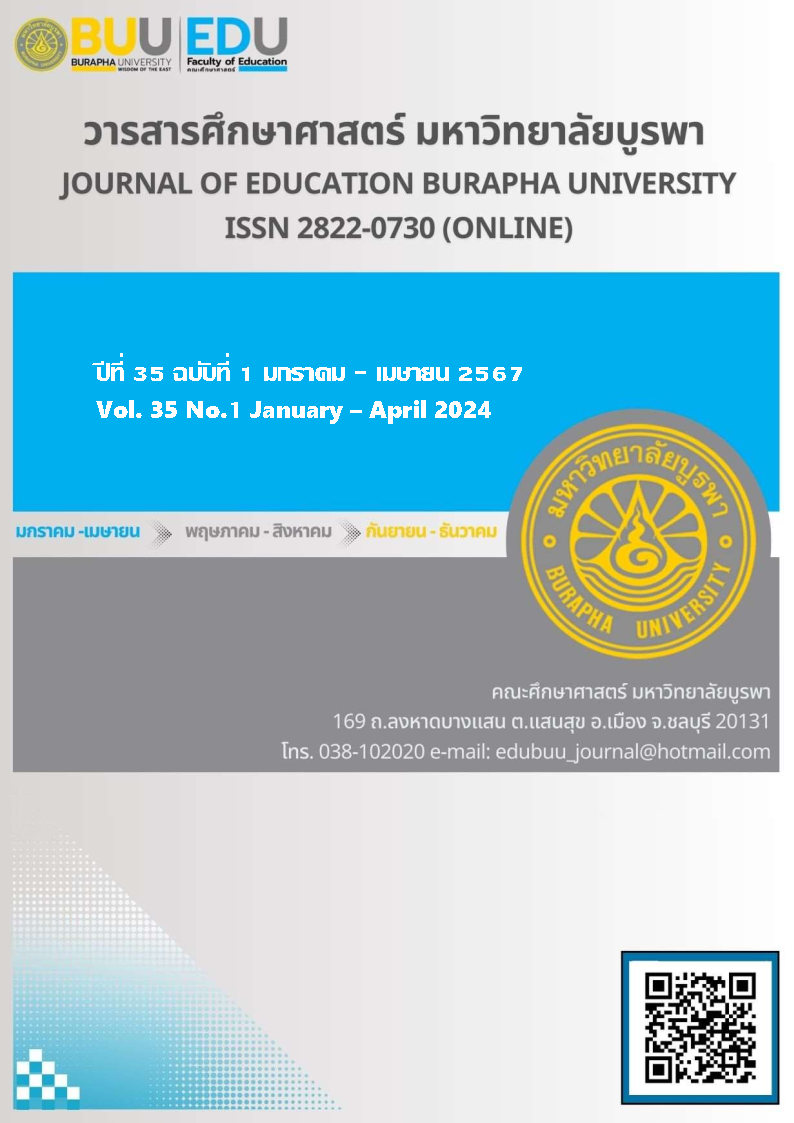ผลของการทำบันทึกเฝ้าดูอารมณ์ที่มีต่อการตระหนักรู้ในตนเองของนักศึกษามหาวิทยาลัยเชียงใหม่
คำสำคัญ:
การทำบันทึกเฝ้าดูอารมณ์, การตระหนักรู้ในตนเอง, จิตวิทยากับชีวิตประจำวัน, นักศึกษาปริญญาตรี, มหาวิทยาลัยเชียงใหม่บทคัดย่อ
การวิจัยครั้งนี้มีวัตถุประสงค์เพื่อศึกษาระดับการตระหนักรู้ในตนเองของนักศึกษามหาวิทยาลัย เชียงใหม่ ทั้งกลุ่มรวมและกลุ่มย่อย จำแนกตาม เพศ ชั้นปี และกลุ่มสาขาวิชา และเพื่อศึกษาผลของการทำบันทึกเฝ้าดูอารมณ์ที่มีต่อการตระหนักรู้ในตนเองของนักศึกษามหาวิทยาลัยเชียงใหม่ กลุ่มตัวอย่าง คือ นักศึกษามหาวิทยาลัยเชียงใหม่ ที่ลงทะเบียนเรียนกระบวนวิชาจิตวิทยากับชีวิตประจำวันและสมัครใจ
เข้าร่วมงานวิจัย จำนวน 595 คน การรวบรวมข้อมูลใช้แบบสอบถามการตระหนักรู้ในตนเอง ฉบับออนไลน์ การวิเคราะห์ข้อมูลใช้ค่าเฉลี่ย ส่วนเบี่ยงเบนมาตรฐาน และการทดสอบความแตกต่างระหว่างค่าเฉลี่ยของกลุ่มตัวอย่างสองกลุ่มที่สัมพันธ์กัน ผลการวิจัย พบว่า ก่อนการทำบันทึกเฝ้าดูอารมณ์กลุ่มตัวอย่างส่วนใหญ่ตระหนักรู้ในตนเองในระดับมาก ยกเว้น กลุ่มตัวอย่างนักศึกษาชั้นปีที่ 4 และชั้นปีที่มากกว่าชั้นปีที่ 4 ที่พบว่าตระหนักรู้ในตนเองในระดับปานกลาง ขณะที่หลังการทำบันทึกเฝ้าดูอารมณ์ พบว่า กลุ่มตัวอย่างทั้งกลุ่มรวมและกลุ่มย่อยทุกกลุ่ม ตระหนักรู้ในตนเองในระดับมาก นอกจากนี้ยังพบว่าหลังจากทำกิจกรรมบันทึกการเฝ้าดูอารมณ์ กลุ่มตัวอย่างตระหนักรู้ในตนเองเพิ่มขึ้น อย่างมีนัยสำคัญทางสถิติที่ระดับ .05
เอกสารอ้างอิง
ประกาศคณะกรรมการมาตรฐานการอุดมศึกษา เรื่อง รายละเอียดผลลัพธ์การเรียนรู้ตามมาตรฐานคุณวุฒิระดับอุดมศึกษา พ.ศ. 2565. (2565, 9 กันยายน). ราชกิจจานุเบกษา. เล่ม 139 ตอนพิเศษ 212 ง. หน้า 35-36.
มหาวิทยาลัยเชียงใหม่. (2563). หลักสูตรหมวดวิชาศึกษาทั่วไป หลักสูตรใหม่ พ.ศ. 2563. https://www.eqd.cmu.ac.th/curr/doc/GE/curr-GE-2563.pdf
มหาวิทยาลัยเชียงใหม่. (2566). ประกาศมหาวิทยาลัยเชียงใหม่ เรื่อง เกณฑ์มาตรฐานการศึกษาระดับปริญญาตรี พ.ศ. 2566. https://www.eqd.cmu.ac.th/CD2022/doc/rule_cmu/announce/CMU%20Undergrad%20Criteria%2066.pdf
สำนักทะเบียนและประมวลผล มหาวิทยาลัยเชียงใหม่. (2564). กระบวนวิชาที่เปิดสอน ภาคการศึกษา 2/2564 (กระบวนวิชา 013110). https://www1.reg.cmu.ac.th/registrationoffice/searchcourse.php?tterm=2/2564H#showrecord
Baresh, E. F. (2022). Developing Libyan undergraduates’ writing skills through reflective journaling: a critical literature review. Journal of English Language Teaching and Learning, 3(1), 27-35.
Bennett-Levy, J., Richards, D. A., Farrand, P., Christensen, H., Griffiths, K. M., Kavanaugh, D. J., Klein, B., Lau, M. A., Proudfoot, J., Ritterband, L., White, J., & Williams, C. (Eds.). (2010). Oxford guide to low-intensity CBT interventions. Oxford University Press. https://doi.org/10.1093/med/9780199590117.001.0001
Brown, L. G. (2022). The Influence of Journaling on Nursing Students: A Systematic Review. Journal of Nursing Education, 61(1), 29–35. https://doi.org/10.3928/01484834-20211203-01
Burkšaitienė, N. (2020). Self-assessment of ESP oral performance: A tool for learning and fostering learner awareness. The Journal of Education, Culture, and Society, 11(1), 146-162.
Collaborative for Academic, Social, and Emotional Learning. (2019). Core SEL competencies. https://casel.org/core-competencies/
DeMink-Carthew, J., Netcoh, S., & Farber, K. (2020). Exploring the potential for students to develop self-awareness through personalized learning. The Journal of Educational Research, 113(3), 165-176.
Dimitroff, L. J., Sliwoski, L., O’Brien, S., & Nichols, L. W. (2017). Change your life through journaling–The benefits of journaling for registered nurses. Journal of Nursing Education and Practice, 7(2), 90-98.
Goleman, D. (1998). Working with emotional intelligence. Bantam.
Goleman, D. (2011). Emotional mastery. Leadership Excellence, 28(6), 12-13.
Kerner, E. A., & Fitzpatrick, M. R. (2007). Integrating writing into psychotherapy practice: A matrix of change processes and structural dimensions. Psychotherapy: Theory, Research, Practice, Training, 44(3), 333-346. https://doi.org/10.1037/0033-3204.44.3.333
Kirkpatrick, A. J., Cantrell, M. A., & Smeltzer, S. C. (2020). Palliative care knowledge and self-awareness in active and observing undergraduate nursing students after end-of-life simulation. International Journal of palliative nursing, 26(3), 133-142.
Law, K. L., & Rowe, J. M. (2019). Promoting self-awareness: an undergraduate in-class activity and its value. Journal of Teaching in Social Work, 39(1), 92-104.
Maltz, M. (1960). Psycho-Cybernetics. https://dingwallasc.files.wordpress.com/2020/03/pscyho-cybernetics-book-maxwell-maltz.pdf
Schnitker, S. A., & Richardson, K. L. (2019). Framing gratitude journaling as prayer amplifies its hedonic and eudaimonic well-being, but not health, benefits. The Journal of Positive Psychology, 14(4), 427-439.
Szczygiel, P. (2021). Navigating student self-disclosure through a relational lens: Examples of increased self-awareness from a social work classroom. Clinical Social Work Journal, 49(1), 77-84.
Ullrich, P. M., & Lutgendorf, S. K. (2002). Journaling about stressful events: Effects of cognitive processing and emotional expression. Annals of Behavioral Medicine, 24(3), 244-250.
Viskovich, S., & De George-Walker, L. (2019). An investigation of self-care related constructs in undergraduate psychology students: Self-compassion, mindfulness, self-awareness, and integrated self-knowledge. International Journal of Educational Research, 95, 109-117. doi:10.1016/j.ijer.2019.02.005
Yamane, T. (1967). Statistics: An Introductory Analysis (2nd Ed.). New York: Harper and Row.
ดาวน์โหลด
เผยแพร่แล้ว
รูปแบบการอ้างอิง
ฉบับ
ประเภทบทความ
สัญญาอนุญาต
ลิขสิทธิ์ (c) 2024 วารสารศึกษาศาสตร์ มหาวิทยาลัยบูรพา

อนุญาตภายใต้เงื่อนไข Creative Commons Attribution 4.0 International License.
ลิขสิทธิ์ของบทความที่ปรากฏในวารสารศึกษาศาสตร์ มหาวิทยาลัยบูรพา เป็นของวารสารศึกษาศาสตร์ มหาวิทยาลัยบูรพา ทั้งนี้บทความทุกเรื่องผ่านการตรวจสอบความถูกต้องทางวิชาการจากผู้ทรงคุณวุฒิ ข้อความและข้อมูลของบทความในวารสารฯ เป็นแนวคิดของผู้แต่ง มิใช่เป็นความคิดเห็นของกองบรรณาธิการ และมิใช่ความรับผิดชอบของคณะศึกษาศาสตร์ มหาวิทยาลัยบูรพา ไม่สงวนลิขสิทธิ์การนำไปใช้ประโยชน์ทางวิชาการแต่ต้องอ้างอิงแสดงแหล่งที่มาและอยู่ในขอบเขตของกฎหมายลิขสิทธิ์



